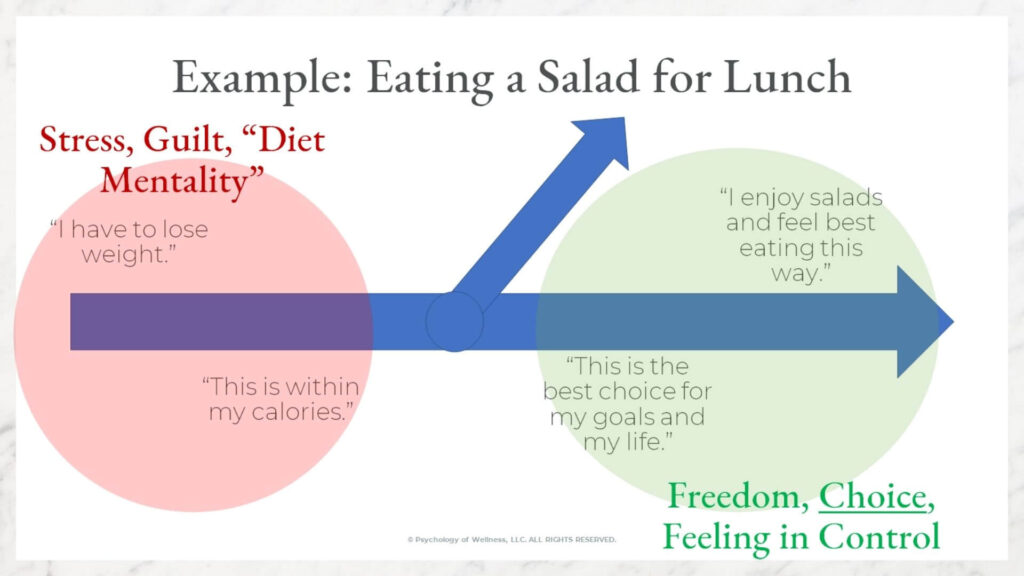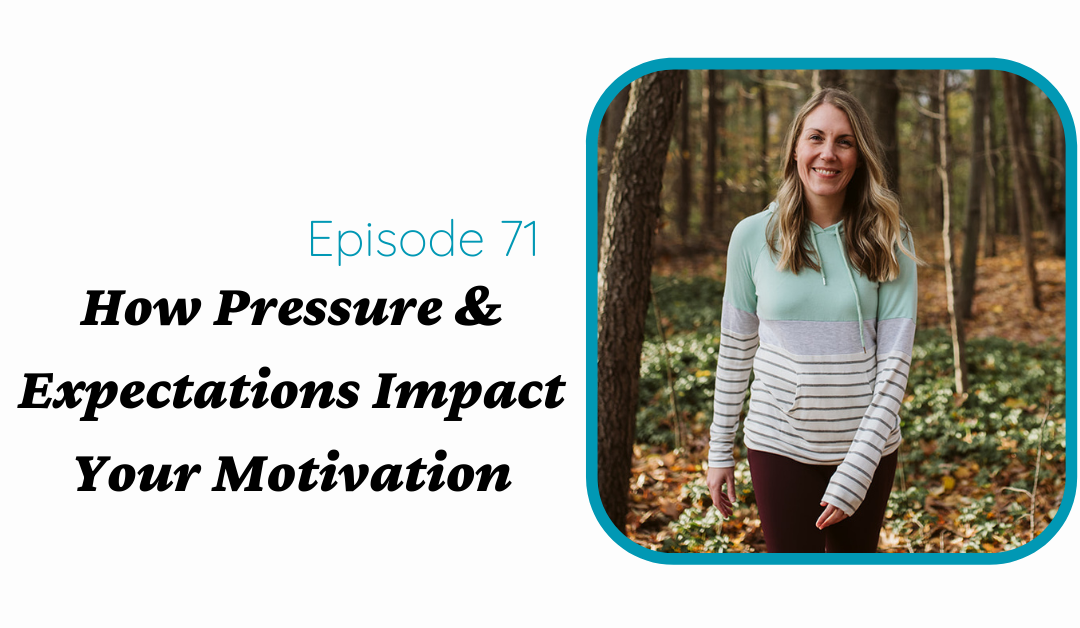Podcast: Play in new window | Download
Subscribe to Motivation Made Easy! Apple Podcasts | Google Podcasts | Spotify | RSS | More
Episode 71. What does March Madness have to teach us about our relationship to food and our eating habits? In this episode of the Motivation Made Easy podcast you will find out!
What to Expect In This Episode
- What watching March Madness basketball teaches us about motivation
- How we can understand the role of diet culture, pressure and body shame on our eating habits by looking at other experiences of pressure and expectations
- How to reduce excessive pressure to improve internal motivation for the changes you want to make in your life
- A fun fact about a basketball players eating habits
Do you ever worry that you are wasting your life?
I definitely did. In fact, I wrote that in my journal many years ago when I was in the middle of the diet-binge roller coaster ride.
- I woke up every day thinking about food, my body, and what I would eat that day to “be healthy”
- The notebooks I had filled with calories and points could fill up a spare bedroom
- Social events and vacations immediately prompted the thought “they will notice I gained weight” or “I need to lose weight by then”
- Deep down I knew I wasn’t living life the way I wanted to, but I didn’t know how to pull myself out of it.
If this is you, I want you to imagine what it would feel like to feel empowered in your body and proud of your choices on a consistent basis. I promise you, it isn’t too late.
Dieting steals our motivation. It makes us ineffective. It keeps us spinning our wheels in a system that was never built to work.
If you are ready take the first step to motivating yourself with what matters to you, download my free Create Powerful Motivation guide (which is quite beautifully designed if I do say so myself), and walk through the 3 simple steps to create motivation that works for YOU in 15 minutes or less. You will get a simple formula to write ONE SENTENCE you can use to motivate yourself on a daily basis.
You can write it on your bathroom mirror, put on the background of your phone, or just read it and repeat it in your mind.
Look, I know how much it hurts to live a life worrying you are missing out, not stepping into the person you were truly meant to be, vibrant, passionate, curious, vulnerable, and brave.
You can listen to the podcast all day, but taking that first step, putting pen the paper (or typing on your phone) is required for true lasing change. It’s time to start living my friend.
It’s 100% free, so what are you waiting for? Grab your free copy of the guide today at DrHondorp.com/Motivate
March Madness, Sandwiches, and Internal Motivation
He looked so incredibly happy, relaxed, and confident. The dude was clearly having the time of his life.
Who am I talking about?
Doug Edert, guard on Saint Peter’s University basketball team, of course.
You may or may not know who he is. But prior to this March Madness tournament, I’m almost sure you didn’t.
Doug is on the Saint Peter’s University basketball team. A team that recently became the first 15 seed to reach the Elite 8.
In the games I watched, Doug looked happy and incredibly relaxed. He appeared to be having fun, and simply enjoying the challenge and the opportunity.
The Freedom of Low Expectations
St. Peter’s had already accomplished so much by making the tournament. They had only made it once before in school history, back in 2011.
St. Peter’s is a private Jesuit university located in Jersey City, New Jersey. The school has 2,637 students.
The Pressure of High Expectations
For comparison, the University of Kentucky, who lost to Saint Peter’s in the first round as a 2-seed (and one of the top favorites to win the entire tournament) has an enrollment of 22,227.
As the game went on, and it became clear that Saint Peter’s very well may win this thing, you see the Kentucky players getting more tense, less relaxed. Certainly not having fun.
When Doug Edert and Saint Peter’s went on to continue to the next game, they continued to look relaxed. Again, they had already so greatly surpassed expectations, they could just enjoy themselves.
The Impact of Expectations and Pressure on Motivation and Eating
Let’s talk about what NCAA basketball can teach us about eating and weight loss motivation by talking about how pressure and expectations affects motivation.
Many times, like the case above, pressure and expectations impairs our ability to enjoy the moment, enjoy the journey of life if you will. This is particularly true when things aren’t going our way (e.g., when you are in a chronic dieting cycle). It is associated with stress, and if chronic, can lead to anxiety, depression, burnout, and many other unwanted consequences.
The Impact of High Expectations
Sometimes, we can rise to the occasion under pressure. However, other times, pressure makes us stressed and feel less effective (e.g., Kentucky misses a few shots) and have a harder time playing our game.
So How Does This Impact Our Eating & Exercise Habits?
If you’ve been hanging with me for a bit, you’ve seen this image. It reminds us that it isn’t “amount of motivation” that matters, but instead the type of motivation that counts.

Internal Motivation Versus Pressure to Have a Salad
The example we use here is having a salad for lunch, but any habit could go here.
When we are living in guilt and diet mentality mindset, it’s easy for having a salad to become a “should” a “chore.” And although we might be able to do it for a while because of this expectation we put on ourselves (driven much of the time by society’s expectation of having a smaller body), we are much less likely to develop an intrinsic motivation for this.
You may or may not ever have intrinsic motivation to have a salad. That may just not sound good to you no matter what pressure you internalize (e.g., thinking you should have it, it’s the “healthy choice”). But that isn’t really the point.
It’s the fact that many people (myself included and people I work with) have a hard time figuring out what the heck they actually like, because of all the “shoulds” and rules. And they certainly have a hard time enjoying the journey of listening to their body, it’s signals, and their own unique preferences.
How Expectations Impact Movement & Exercise
Now let’s take a look at how pressure and expectations might impact motivation for exercise.
I want you to consider for a moment two women walking into an exercise class.
They both enjoy learning new things and they have tried a yoga class at home and found it nice, but wanted to come to a class to get further guidance on how to do the poses.
Autumn is in a smaller body. She looks up the studio online and sees images of other women who look just like her. She comes to class and sees an instructor with a similar body to her, and many of the women in the class also have a similar body type to her.
Although she’s new to yoga, she is able to relax and enjoy the process of learning. Taking instruction as feedback, enjoying the process. She starts coming back regularly.
Now let’s look at Jessica. Jessica is in a larger body. She has re-gained weight after losing around 80 lbs with medical weight loss, but then this weight returned (as it almost always does) and she is feeling uncomfortable in her body and ashamed.
She looks up on the class on the website and sees women’s bodies who don’t look like her. She is reminded that she isn’t really meeting the yoga body expectation.
She is anxious about coming to class, and anxious throughout the class. She is thinking about how her body looks in the poses and having a hard time focusing on the actual function of her body and the pose, making the learning process less enjoyable.
Reduce the Pressure to Allow Your Personalized Healthy Habits to Take Root
So how can we take the pressure off of us when it comes to eating and enjoying the process of learning to nourish our bodies??
Well first lets look at the things that cause pressure:
- Social expectations and messages about what bodies should look like
- Upcoming events (vacation, wedding)
- Pressure from new diagnoses (e.g., diabetes) that cause shame or anxiety about future health consequences
- Cruel comments from people in your life about your weight or appearance
- Internalized negative self-talk (e.g., internally yelling at yourself when you eat more than you meant to)
- And much more…
So How Can We Reduce the Pressure and Enjoy the Journey?
- Name the things causing the pressure. Notice where the pressure is coming from in your life on a day to day basis. Is it that phone call with your mom? Is it seeing your friends post pictures in their bathing suits on social media and getting anxious about the summer? Is it the ways you are talking to yourself about your body?
- Remove them if possible. Deleting social media (or at least take it off your phone) can go a long way to reduce stress overall. If you notice yourself having thoughts like “I need to lose weight before summer”, remind yourself that your body is okay and you can take care of yourself without an urgent need for weight loss.
- Develop resilience to the diet culture messages. Notice and talk back to the BS thoughts that tell you your body isn’t okay. Surround yourself with people with diverse bodies as much as you can, even if it’s just changing who you follow on social media or trying to find an exercise class that doesn’t just have 1 body type on their website or in the class.
- Lean into learning mindful eating or Intuitive Eating. Grab one of the many amazing resources on these topics (Intuitive Eating is a great start, but I outline all my favorites here) and get learning!
- Find supports who get it. I always must mention this – because it’s crucial. This can be a friend, a counselor, a coach, or an online community. No matter how much resilience we have to them, diet culture messages are still incredibly strong. Find whatever you can to help counteract these messages with people that remind you that you on on the right path to finding health and well-being for you.
Fun Fact About Picky (Intuitive?) Eater Doug Edert
Apparently Doug Edert is not only intrinsically motivated during the NCAA tournament, he also can teach us about intuitive eating with his picky eating habits. He confirmed in an interview with Outside the Lines that he will not eat sandwiches. Zero kinds of sandwiches.
He’s never had a wrap. He will eat Italian bread and chicken, but not together.
The sports world is baffled by this.
But I think it goes to show you, Doug isn’t giving in to the pressure of what he should eat, and neither should you.
Support Independent Bookstores Near You!
Did you know that that if nothing slows their momentum, Amazon will have almost 80% of the book market by the end of 2025?
Look, I love the convenience of Amazon, but I’ve got a super cool way that you can support local bookstores and my blog and podcast simply by buying books like you already do! You can choose any bookstore on the list in the US and Canada (they plan to expand to other counties in the future) OR you can just let the donation get split between all stores. As of this recording, they have raised 15 million dollars for local bookstores. On my bookshop, you will see my absolute favorite books related to health and wellness, courage and vulnerability, and even my favorite fiction and kids books!
A favorite of mine related to improving the quality of our lives was Digital Minimalism. Our family actually has decided to do an optional screen free month to re-evaluate the role of screen time in our lives.
So if you believe in supporting local businesses, please consider buying your books through Bookshop from now on!
The Psychology of Wellness Bookshop Link.

Disclaimer: This blog and podcast is for informational and educational purposes only. It is not a substitute for individual professional advice or treatment, including medical or mental health advice. It does not constitute a provider patient relationship.
Disclosure: Using the Bookshop.org links in this post means that I would get an affiliate fee if you purchase from the online bookshop (this supports my business, and local bookstores too!).
